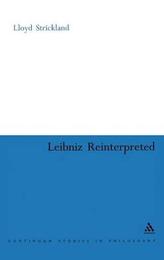
|
Leibniz Re-interpreted
Hardback
Main Details
| Title |
Leibniz Re-interpreted
|
| Authors and Contributors |
By (author) Dr Lloyd Strickland
|
| Series | Continuum Studies in Philosophy |
|---|
| Physical Properties |
| Format:Hardback | | Pages:192 | | Dimensions(mm): Height 234,Width 156 |
|
| Category/Genre | History of Western philosophy |
|---|
| ISBN/Barcode |
9780826490285
|
| Classifications | Dewey:193 |
|---|
| Audience | | Postgraduate, Research & Scholarly | | Professional & Vocational | |
|---|
|
Publishing Details |
| Publisher |
Bloomsbury Publishing PLC
|
| Imprint |
Continuum International Publishing Group Ltd.
|
| Publication Date |
24 April 2006 |
| Publication Country |
United Kingdom
|
Description
Leibniz Reinterpreted tackles head on the central idea in Leibniz's philosophy, namely that we live in the best of all possible worlds. Strickland argues that Leibniz's theory has been consistently misunderstood by previous commentators. In the process Strickland provides both an elucidation and reinterpretation of a number of concepts central to Leibniz's work, such as 'richness', 'simplicity', 'harmony' and 'incompossibility', and shows where previous attempts to explain these concepts have failed. This clear and concise study is tightly focussed and assumes no prior acquaintance with Leibniz or optimism. It thus serves as an ideal entry point into Leibniz's philosophy.
Author Biography
Lloyd Strickland is Reader in Philosophy at Manchester Metropolitan University. His publications include Leibniz Reinterpreted (2006), Shorter Leibniz Texts (2006), Leibniz and the Two Sophies (2011) and Leibniz's Monadology (2014), and he has published numerous articles in journals such as British Journal for the History of Philosopy, Religious Studies, Annals of Science and Archiv fur geschichte der philosophie. He also runs a highly successful website devoted to Leibniz: www.leibniz-translations.com
Reviews"This is an important book because it recognizes that the Synoptic Problem is not unimportant rather it is vital. Christopher Tuckett's article 'Synoptic Problem' in the ABD gives a good succinct survey in the issues. This book can be regarded as being important to the commonly held view on the development of early Christianity as much as a rebuttal to the fames Oxford-Streeter two-documented hypothesis. The book is a magisterial achievement in hat it explains how Mark's gospel could be understood and explained from the perspective of its being dependent upon Matthew and Luke." -Restoration Quarterly "An outstanding success. The authorshows a capacity for writing and arguing clearly and concisely, a skill and confidence in translation, a familiarity with both central and out of the way Leibniz texts and sophistication in interpretation and a good knowledge of other optimists The book is a pleasure to read: everything is perspicuous and the work is well-structured. " Professor Stuart Brown (Open University) * Blurb from reviewer * "Strickland has trawled through all of the works available so far and given the best account to date; writing with verve and polish, he makes it a thoroughly enjoyable experience." -Patrick Madigan, Heythrop Journal, March 2009 -- Patrick Madigan * Heythrop Journal * 'a fitting introduction for the reader unfamiliar with Leibniz's optimism.' ~ Laurence Carlin, University of Wisconsin Oshkosh, Notre Dame Philosophical Reviews, February 2007 -- Laurence Carlin, University of Wisconsin Oshkosh * Notre Dame Philosophical Reviews *
|